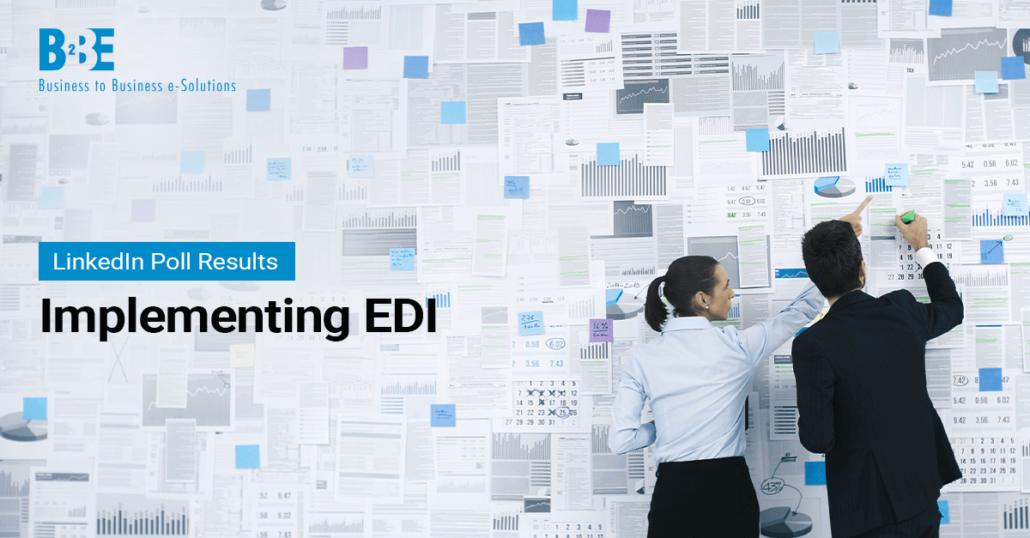In today’s rapidly evolving business landscape, organisations are embracing diversity and inclusion as integral components of their success. One of the cornerstones of this movement is the implementation of Electronic Data Interchange (EDI). EDI is a transformative technology that streamlines the exchange of information and fosters equitable and efficient business practices. Implementing EDI presents an unparalleled opportunity to revolutionise how companies interact, collaborate, and co-create across borders, industries, and cultures.
However, despite the evident advantages, the road to EDI implementation is often riddled with obstacles. A myriad of complexities and nuances can confound even the most forward-thinking organisations. From global enterprises to small businesses, many struggle to surmount these hurdles, seeking a clear understanding of the biggest barriers that impede their path to EDI integration.
Poll results
In our most recent LinkedIn poll, we asked our social media followers what is the biggest barrier to implementing EDI in their organisation.
Implementing EDI: What we found
Initial Cost – 56%
According to the poll, a significant 56% of respondents pointed to “initial cost” as the primary obstacle of implementing EDI. This response reflects a common concern among businesses when considering the adoption of EDI technology.
The perceived barrier of initial cost may be rooted in various factors that organisations face during the implementation process. For example, infrastructure investment or integration complexity. However, despite the perceived barrier of initial cost, it’s essential to note that the advantages of EDI implementation often outweigh the upfront investment. Once integrated, EDI can significantly enhance operational efficiency, reduce manual errors, improve data accuracy, shorten order cycles, and foster stronger relationships with trading partners. Over time, these benefits can lead to substantial cost savings and increased competitiveness in the marketplace.
Time to set up – 22%
Among the respondents to the recent poll on barriers to implementing Electronic Data Interchange (EDI) in organisations, 22% identified “time to set up” as a significant obstacle. This response reflects a genuine concern among businesses regarding the time and effort required for a successful EDI implementation.
Despite the time-intensive nature of setting up EDI, it is essential to recognise that the effort invested in the initial implementation can yield substantial long-term benefits. Once the system is up and running, organisations can experience streamlined processes, faster order processing, reduced manual errors, and improved overall efficiency.
Lack of resources – 22%
Finally, 22% of respondents cited “lack of resources” as a significant obstacle. This response reflects a common challenge faced by businesses when attempting to adopt EDI technology. EDI implementation can require a substantial initial investment in hardware, software, and related infrastructure. For organisations with limited financial resources or budget constraints, this investment can pose a significant barrier.
Despite the challenges presented by a lack of resources, it is essential to consider potential solutions and alternative approaches. Businesses can explore options such as cloud-based EDI solutions, which often reduce the need for substantial upfront investments and ease the burden on internal IT resources. Collaborating with experienced EDI service providers can also help organisations streamline the setup process and leverage external expertise for implementation and support.
Learn more about B2BE’s EDI solution.
Meer informatie
B2BE's ervaring in de toeleveringsketensector stelt onze klanten in staat met succes te bouwen, uit te breiden en zich aan te passen, waardoor een grotere effectiviteit mogelijk is. Om in contact te komen met B2BE en feedback te geven over wat voor u en uw bedrijf het belangrijkst is, kunt u het volgende doen volg ons op LinkedIn en via sociale media. U kunt ook Stem in onze laatste LinkedIn poll. Als u uw supply chain-strategie wilt bespreken, contact opnemen met ons.
